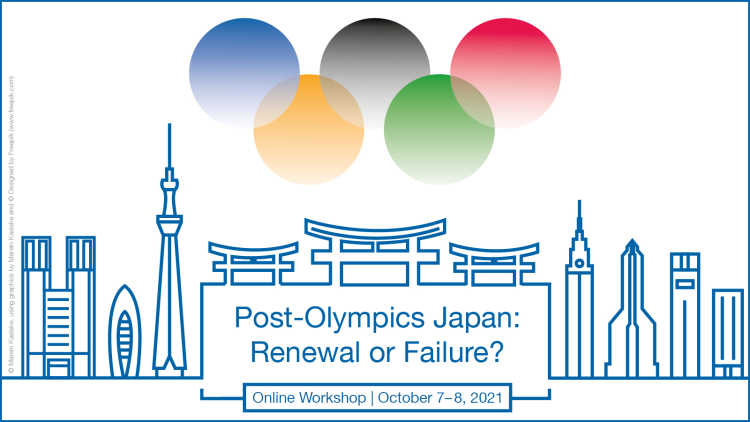- Home
- Events
- Conferences and Workshops
- Post-Olympics Japan: Renewal or Failure?
Online Workshop
Post-Olympics Japan: Renewal or Failure?
Date
07/10/2021 - 08/10/2021

Envisaged as an event to remind the world of Japan’s leadership aspirations and innovation power and to fully establish it as a tourism magnet, the Tokyo Olympics 2020 have turned out to be a completely different story. Due to the COVID-19 pandemic, the games had to be postponed to 2021 and eventually took place from 23 July until 8 August during a declared state of emergency banning fans from the venues. As Japan had been facing a fifth COVID-19 wave ahead of the Olympic Games, a large majority of Japan’s population preferred to delay it for another year or even to cancel it altogether. What was meant to be a showcase of the abilities of the current government and a culmination of its achievements, caused another plunge of Prime Minister Suga`s approval ratings and thus became an important factor for his decision to step down in view of the upcoming elections this fall.
Two months after the Olympic Games 2021, we would like to hold an online workshop on 7–8 October about the impact of the Games and the gap between original aspirations and concrete results. Therefore, we will have sessions on the following topics: the political economy of Olympics, political communication, historic perspectives, diversity, social movements and voluntarism, technology and innovation, mass media and public discourse. Our panel discussion at the end of the Workshop tackles the question: “What remains?”
The GIGA is conducting the online workshop in cooperation with the University of Zurich (UZH) and the German Association for Social Science Research on Japan (VSJF).
Organisation: Prof. Dr. David Chiavacci Institute of Asian and Oriental Studies, University of Zurich [email protected]
Dr. Iris Wieczorek GIGA Institute for Asian Studies [email protected]
Programme
7 October 2021 | 9:00 a.m.–12:30 p.m. CET | 4:00–7:30 p.m. JST
Session 1 – Political Economy of Olympics | 9:00–9:50 a.m. CET | 4:00–4:50 p.m. JST
Test Positive Olympics Yasushi Aoyama, Meiji University, Tokyo
The 2020 Tokyo Olympics as a 'Turning Point' for the Olympic Movement: Creative Reconstruction, Bio-Politics and Capitalist Realism Ichii Yoshifusa, Ritsumeikan University, Kyoto
Session 2 – Political Communication | 9:50–10:30 a.m. CET | 4:50–5:30 p.m. JST
The 2020/2021 Tokyo Olympics: Does Japan Get the Gold Medal or the Wooden Spoon? Sebastian Maslow, Sendai Shirayuri Women's University Paul O`Shea, Lund University
Online Political Communication about the Tokyo Olympics Jonathan Lewis, Hitotsubashi University, Tokyo
Break | 10:30–10:50 a.m. CET | 5:30–5:50 p.m. JST
Session 3 – Historic Perspectives | 10:50–11:30 a.m. CET | 5:50–6:30 p.m. JST
Akira between 1964, (1988) and 2020/21 Christian Tagsold, Heinrich Heine University Düsseldorf
Post-Olympics Japan: Renewal AND Failure „Once again that Dream?" Steffi Richter, Leipzig University
Session 4 – Diversity | 11:30 a.m.–12:20 p.m. CET | 6:30–7:20 p.m. JST
Tokyo 2020 Unity in Diversity – From a Mega-event Motto to Social Change to (Super-)Diversity? Sakura Yamamura, Max Planck Institute for the Study of Religious and Ethnic Diversity, Göttingen
Policy Change in the Shadow of the Olympics: Disability Activism and Accessibility Reforms in Japan Celeste L. Arrington, George Washington University, Washington DC, and Mark R. Bookman, The University of Tokyo
8 October 2021 | 9:00 a.m.–12:30 p.m. CET | 4:00–7:30 p.m. JST
Session 5 – Social Movements & Voluntarism | 9:00–9:50 a.m. CET | 4:00–4:50 p.m. JST
From 'No Olympics 2020' to 'NOlympics Anywhere': Reflecting on the Anti-Olympic Movements in Japan before and after Tokyo 2020/1 Sonja Ganseforth, German Institute for Japanese Studies, Tokyo
Tainted Love: Volunteering for the Pandemic Olympics Barbara Holthus, German Institute for Japanese Studies, Tokyo
Session 6 – Technology & Innovation | 9:50–10:30 a.m. CET | 4:50–5:30 p.m. JST
Tokyo 2020: The Implementation of an Event-oriented Urban Function in the Bay Area Alexandre Faure, Fondation France-Japon de l'EHESS, Paris
Tokyo 2020 as the Most Innovative Olympic Games in History? Iris Wieczorek, GIGA Institute for Asian Studies, Hamburg
Break | 10:30–10:50 a.m. CET | 5:30–5:50 p.m. JST
Session 7 – Mass Media & Public Discourse | 10:50–11:30 a.m. CET | 5:50–6:30 p.m. JST
The Olympic Logo Scandal and the Case of Sano Kenjiro Igor Prusa , Metropolitan University Prague & Ambis College Prague
Recovery flame': The Tokyo 2020/21 Olympic Torch Relay as Media Event Andreas Niehaus, Ghent University
Panel Discussion – “What Remains?” | 11:30 a.m.–12:45 p.m. CET | 6:30–7:45 p.m. JST
Moderator: David Chiavacci, University of Zurich
Panelists:
Yasushi Aoyama, Meiji University, Tokyo
Barbara Holthus, German Institute for Japanese Studies, Tokyo
John Horne, Waseda University, Tokyo
Wolfram Manzenreiter, University of Vienna
Andrew Zimbalist, Smith College, Northhampton
Address
Online event
Language
English